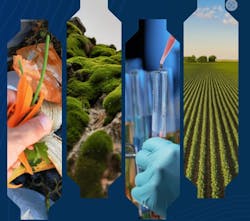Biotech startup plans next-gen Sustainable Chemical Manufacturing
Sometimes the smallest shall be the greatest, and the tiniest of organisms will play a dramatic future role in sustainability on both the energy and technology fronts.
Capra Biosciences, a biotech company based in Manassas, Virginia, is taking a step towards sustainability by scaling up its bioreactor technology to produce sustainable chemicals.
The expansion project, funded through the BioMADE Project Call and supported by philanthropic initiative Schmidt Futures, aims to advance bioreactor design and development. BioMADE is a public-private partnership focused on bio-industrial manufacturing innovation, education and collaboration, while the Schmidt Futures initiative finds exceptional people and helps them do more for others together.
Capra uses a proprietary bioreactor and a biofilm-forming microbe to convert low-cost feedstocks, such as agricultural byproducts and food waste, into chemicals, including its first product retinol. Through this expansion, Capra hopes to jump-start Virginia’s bioeconomy and put the state on the map for sustainable biochemical production.
“Our bioreactor platform is meant to handle small- or large-scale production of chemicals efficiently without a negative environmental impact,” said Andrew Magyar, Chief Technology Officer of Capra Biosciences. “We’ve already proved its potential on a smaller scale, and we’re excited to scale it for more chemicals and larger volumes. The new contract not only allows us to create a bigger facility, it also funds work with groundbreaking partners who will improve the efficiency and predictability of the bioreactors.”
The company says its sustainable approach aligns with the larger national strategy to increase domestic manufacturing using biology. President Biden’s executive order to advance biomanufacturing innovation aims to grow sustainable industries, strengthen the economy and bring more manufacturing back home.
Bio-energy firms are doing similiar work, taking microbes to convert waste products such as animal fats and vegetables into renewable natural gas and diesel fuels.
See EnergyTech's full coverage of Biofuel's role in the C&I Energy Transition
Check out our latest EnergyTech Transitions Newsletter
With stories on Chemical plant Cogeneration, Landfill-to-Energy for BMW and more
Capra is also partnering with Massachusetts’ Boston University (BU) and Next Rung Technology to refine its processes, develop advanced sensors and design a manufacturing facility for sustainable operations. BU’s eVOLVER platform will allow Capra to test small amounts of feedstock to better predict how well it will perform in creating the desired chemicals.
The university will also create advanced, miniaturized wireless sensors that will continuously monitor bioreactor performance and enable adaptive, real-time reactor control. Meanwhile, Next Rung Technology will leverage its industrial biomanufacturing expertise to design the manufacturing facility for sustainable operations. The pilot plant is expected to open in mid-2025.
About the Author
EnergyTech Staff
Rod Walton is head of content for EnergyTech.com. He has spent 17 years covering the energy industry as a newspaper and trade journalist.
Walton formerly was energy writer and business editor at the Tulsa World. Later, he spent six years covering the electricity power sector for Pennwell and Clarion Events. He joined Endeavor and EnergyTech in November 2021.
He can be reached at [email protected].
EnergyTech is focused on the mission critical and large-scale energy users and their sustainability and resiliency goals. These include the commercial and industrial sectors, as well as the military, universities, data centers and microgrids.
Many large-scale energy users such as Fortune 500 companies, and mission-critical users such as military bases, universities, healthcare facilities, public safety and data centers, shifting their energy priorities to reach net-zero carbon goals within the coming decades. These include plans for renewable energy power purchase agreements, but also on-site resiliency projects such as microgrids, combined heat and power, rooftop solar, energy storage, digitalization and building efficiency upgrades.
